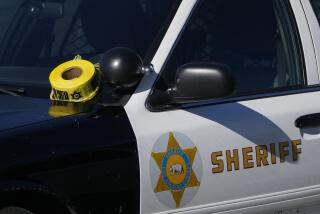Michael Hastings’ family reportedly planned ‘detox’ at time of crash
Journalist Michael Hastings’ family was about to stage an intervention to try to get the reporter into “detox” on the same day his Mercedes burst into flames after hitting a tree, Los Angeles coroner’s officials said Tuesday.
Hastings, 33, died instantly, with the massive blunt-force trauma killing him “within seconds” of the single-vehicle collision on June 18 in Hancock Park, the report said.
No alcohol was detected in his system, but there were traces of drugs, according to the report. Authorities did not believe the drugs were a contributing factor in the crash.
An unidentified relative told investigators that after 14 years of sobriety, the journalist had begun “[using] drugs again in the past month or so.” The relative, whose identity was redacted from the report, told an investigator the family believed Hastings was using DMT, a powerful hallucinogenic. But tests for the drug were negative in Hastings’ body and an autopsy also found no signs of alcohol.
DOCUMENT: Read the autopsy report
The coroner’s report, however, said Hastings had traces of amphetamine in his system, consistent with possible intake of methamphetamine many hours before his death. Marijuana was also detected.
A medical marijuana card was found in Hastings’ wallet; the substance had been prescribed for treatment of post-traumatic stress resulting from his time as a war journalist in Iraq and Afghanistan.
One relative had arrived in Los Angeles from New York the day before the accident, with his brother scheduled to arrive later on the day of the crash “as his family was attempting to get [Hastings] to go to detox,” the report stated.
Hastings, according to the coroner’s report, had previously been institutionalized for rehabilitative care in 1999. A witness told investigators that Hastings had been abusing Ritalin.
His family told detectives that Hastings had been in a past traffic incident in which he crashed into a pole several years ago, and that he may have been abusing Ritalin at the time.
Hastings was not known to be suicidal, but did consider himself “‘invincible,’ believing he could jump from a balcony and would be okay,” according to the report.
Hours before the crash, Hastings had last been seen by a relative “passed out” sometime between 12:30 a.m. and 1 a.m. The crash occurred just before 5 a.m.
In an interview with CNN, Hastings’ widow Elise Jordan called the crash a “really tragic accident.”
She told CNN’s Piers Morgan earlier this month that she didn’t “really have anything to add” to the ongoing police investigation into the crash that took her husband’s life.
“You know, my gut here was that it was just a really tragic accident, and I’m very unlucky, and the world was very unlucky,” Jordan said.
Hastings’ Mercedes crashed on Highland Avenue near Melrose Avenue. The Los Angeles Police Department said there were no signs of foul play.
His death prompted numerous conspiracy theories, most suggesting that the famed journalist may have been killed while chasing his next big story.
The FBI said that Hastings was never under investigation by the agency.
“At no time was journalist Michael Hastings ever under investigation by the FBI,” the agency said in a statement.
Hastings’ 2010 Rolling Stone profile of Gen. Stanley McChrystal, “The Runaway General,” exposed the general and his staff’s disdain for their superiors, including National Security Advisor James L. Jones, Vice President Joe Biden and President Obama.
Hastings won the prestigious George Polk Award for magazine reporting and later wrote a book about McChrystal and his time in the war zone.
ALSO:Pomona’s wave of killing continues with deadly drive-by
Filner apparently still in harassment mediation, not at City Hall
Fatal limo fire brings company a $7,500 fine but no criminal charges
Twitter: @anblanx
Twitter: @lacrimes| Google+
More to Read
Sign up for Essential California
The most important California stories and recommendations in your inbox every morning.
You may occasionally receive promotional content from the Los Angeles Times.











